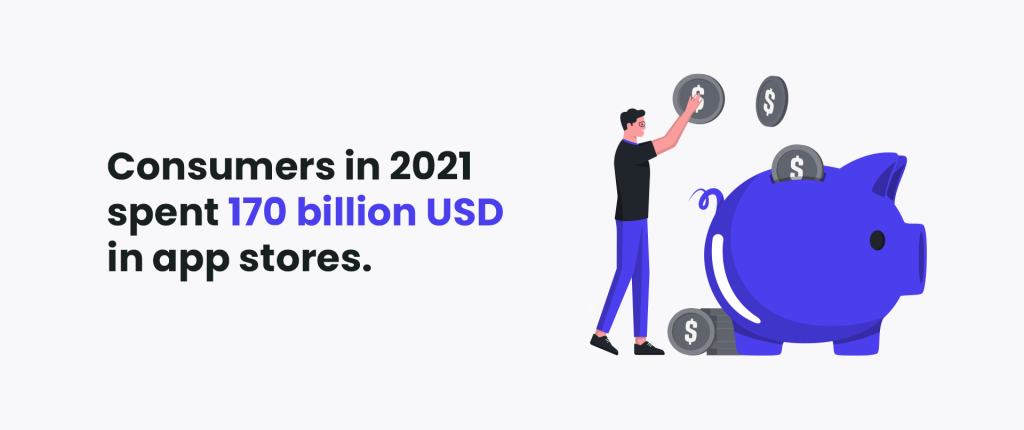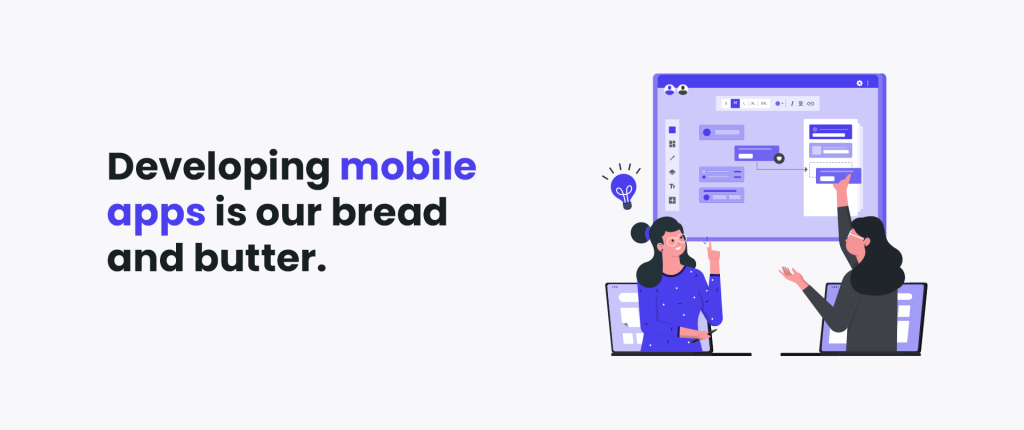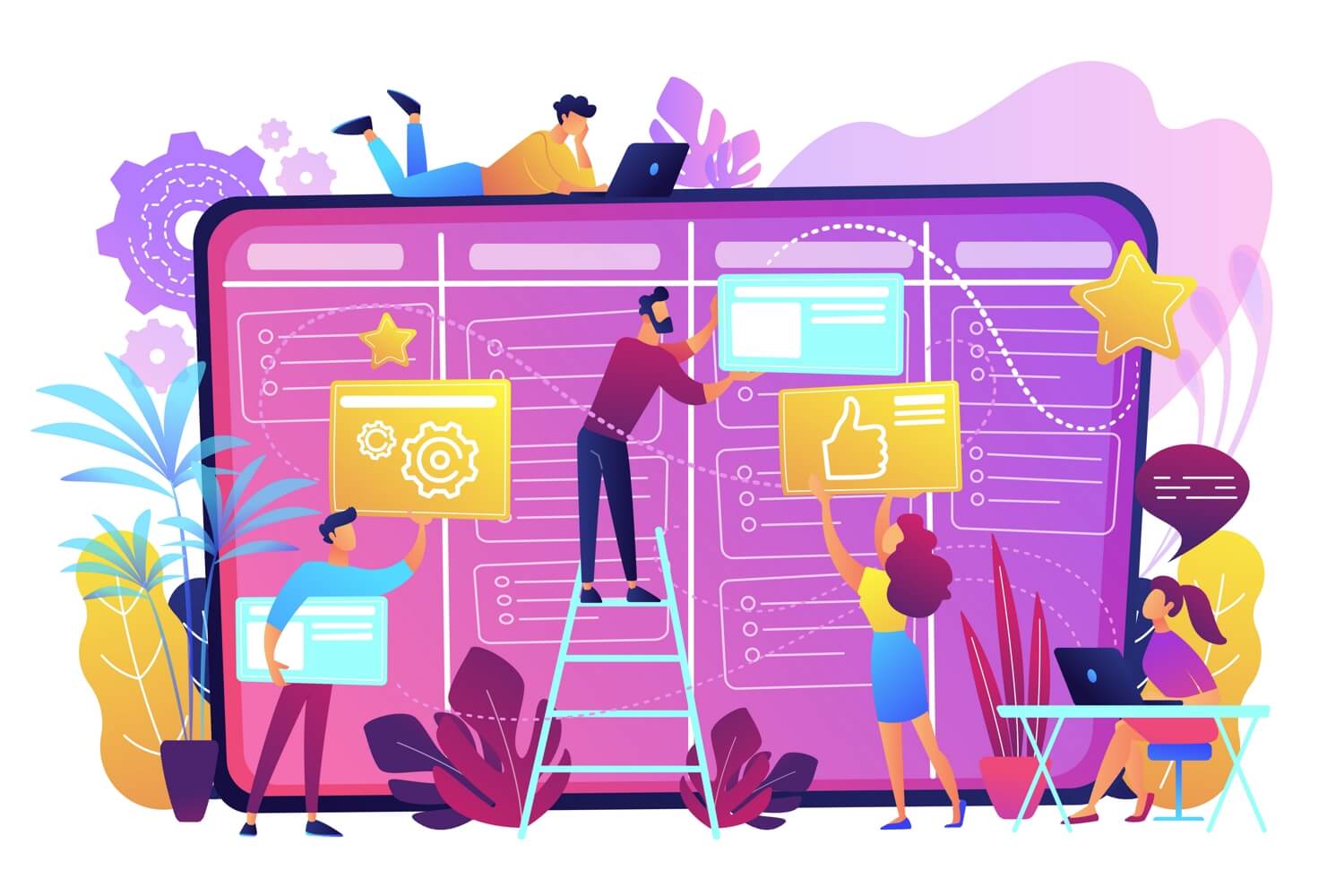What is a mobile app?

Bartosz Pieślak

Jakub Turkowski

Alexa Trachim
The whole world is going digital, and it’s no surprise – it’s very convenient to have information, services, and products at your fingertips, literally. According to Statista.com, there were 7.1 billion mobile users worldwide. Being absent in the online space translates to losing profit. Just imagine – users have downloaded over 435 000 apps per minute in 2021 (according to the State of mobile 2022 report). The numbers speak for themselves, the mobile app market should not be underestimated. Learn more about mobile apps, mobile app development, and discover hard data about why mobile apps help boost the ROI significantly. We know how to do it – we have over 100 case studies in our portfolio. Fasten your seatbelt and keep on reading.
What is a mobile application? Let’s go to the basics!
Mobile apps are software applications designed to run on mobile devices such as smartphones and tablet computers. While they may be small in functionality (but don’t have to be), they deliver a high-quality service or experience to users. Apps range from simple games to highly sophisticated solutions – it all depends on the needs and expectations of the targeted audiences.
Of course, developing a sophisticated, multi-functional mobile app is not impossible (read more in our previous article here). But the reality is that consumers want and expect particular functionalities. Thus, mobile apps are designed to provide limited functionality. Let’s be honest here, every mobile user uses some kind of application – may be it a web browser, a flashlight, or a social media app.

Why investing in the mobile app will boost your ROI?
This is probably the question that you already have in mind. Will investing in a mobile app get you any profit? Well, yes – and we have numbers again to prove it. According to the State of mobile 2022 report, the consumers in 2021 spent (prepare for this) 170 billion USD in app stores. Any further questions about investing in mobile application development?
This is 19% more than in the previous year. Considering the fact that we – humans – will not stop using mobile phones any time soon, this is a good investment. Just look around when you’re outdoors – how many people are using their phones around you? You have the answer. Now, let’s move on to the part of explaining the process of mobile app development.
Mobile app development – what you need to know
The process starts with identifying the business goal. What your new app is going to offer your potential users? What is the targeted audience, and what are the needs of consumers in that group? After settling that up, we move to the technical part. The crucial part is that we have a unique approach – we listen to you.
We need to know if you need an app for a mobile device or if your vision is focused on web apps. Our teams have taken traditional software development to a brand-new level with knowledge of the programming languages, but before the mobile application development process starts, we are going to have a chat with you.
Demographics are one thing, but you need to clarify if your new mobile application is going to be dedicated to iOS, Android, or desktop? It can also be a hybrid. What do these mean in practice? Worry not, here are some details you have to know. You don’t have to waste your precious time digging for info on the Internet, we gathered all the necessary things about mobile application development here. Read on!
Native apps – designed for specific operating systems
They are called “native apps” for a reason – such apps run only on a single operating system. So, you cannot download a mobile app designed for Android operating system on iOS or vice versa. This creates some limitations (according to businessofapps.com, Android has around 70% of the market share, iOS has around 30%) in terms of the global market share of mobile apps, but also it has advantages.
Whether you have a vision of a digital product for android devices or iOS, we will help you get that done for any particular device and for multiple platforms. We have experts on board, and we have the best developer tools. Native development is in our blood, we know every operating system, and we have mastered our skills in mobile development,
Native applications deliver an excellent user experience – and this is a factor that definitely should not be underestimated. The apps are created to meet (and exceed – if possible) the users’ expectations and needs. Providing consumers with an outstanding user experience always pays off. Think of it in this way – why would you use a mobile app that is not convenient and simply useful for you? Your mobile device is your portable command center.
Another advantage is the high performance of native mobile apps. They are developed with a native device User Interface. Our developers are experts in their fields, so each native UI is their natural environment. This also speeds up the process of developing a mobile app. Thus, cooperation with us means that we can create your native apps for chosen mobile devices almost in two shakes of a lamb’s tail (compared to our competitors).
Cross-platform apps – a hybrid solution
You may need a mobile app that should run on different platforms. A cross-platform application is a solution, but you need to know what are the pros and cons of hybrid apps. First, and foremost, the development process is quite fast, and you receive a single codebase. It is very useful if you plan the future development of your mobile application.
Moreover, a cross-platform mobile app is like a chameleon – it will (in most cases) look the same on various platforms. In addition, the user experience should be similar on Android, iOS, or Windows. Building hybrid apps is usually slightly cheaper than developing a native app – which also could be an advantage.

We have a lot of experience in this field, we have created mobile applications with Flutter. Are you wondering how it works, and what exactly Flutter is? Check out this content about mobile application development with Flutter here. Our mobile developers know it inside-out.
However, you need to know that even though you can expect lower costs of development and maintenance, there might be issues with the design and functionality. Of course, our team of experts will implement the necessary tweaks in their hybrid apps, but still – sometimes slight differences in the looks or functionality are hard to avoid.
Nevertheless, a cross-platform mobile app may be the best option for you. Contact us, and we shall take care of the whole mobile development process. From understanding your vision to creating innovative mobile applications – we provide knowledge, teams, tools, and even more. You save your time – we get mobile applications developed.
Native or cross-platform? Which one will work best?
As we mentioned before – it all depends on your business goals and on your targeted audiences. If you are not sure which option is going to suit you best, ask your IT partner. On our side, you will receive our team of experts with all the required skills and experience. We are focused on effectiveness, so you will get an excellent product without stressing about exceeding the budget.
If you feel that you need to know more details about the mobile app development process and about native applications or cross-platform apps – get our free ebook here. You will find all the information about the features of each solution, the differences between these apps, as well as other crucial stuff – namely, the benefits of implementing these solutions. Need additional information? Use the button below to contact us and receive a free estimate within 48 hours.
Mobile apps – an element of the daily routine
Mobile phones are an integral part of our lives. According to the Digital 2022 Global Overview Report from Hootsuite & GWI, 96.2% of Internet users (aged from 16 to 64) own a smartphone. Add to that the facts, that the average time spent using the Internet (the same group) is 6 hours and 58 minutes, and that 92.1% of consumers use their mobile phone to access the Internet. People just use smartphone features every single day.
This is not a trend anymore, this is reality. You want your business to grow, that’s natural. Well, can you afford not to take part in the mobile market? According to Statista.com, the revenue of mobile apps worldwide in 2021 hit 400 725 000 000 USD, and it’s forecasted that these numbers will significantly increase in the upcoming years. As you can clearly see, mobile application development pays off. Together, we can help you bring your vision to life and boost your ROI.
The market will expand, there is no question about it. People use mobile devices (and mobile apps) for various reasons, such as:
- Self-development
- Entertainment
- Work
- Social interaction
- Research of health information
And this is not a full list. The pandemic had an impact on the whole world, also in the aspect of using the Internet and mobile apps. You probably think of Millennials and Gen Z in relation to mobile apps. The truth is that we have now a generation of “Digital Seniors”, who use Social Media channels and payment apps. User engagement is something you cannot underestimate these days. Digital Seniors don’t use early mobile devices, and they know a thing or two about integrated software systems.
Mobile apps are an element of the daily routine for basically everybody. Since we are speaking about the Internet, mobile apps, and pandemics – did you know that we have over a decade of experience in building dedicated solutions for the Healthcare sector?
Types of mobile apps – get to know them
There is a massive landscape of mobile apps – just like the needs of users. To help you have a clear picture of the current situation in the mobile app market, here are the main types of mobile apps:
- Gaming apps – Gaming apps – this is a gigantic part of the gaming market. According to Statista.com, 59% of the global gaming market belongs to mobile apps. Statista.com also projects that the mobile content gaming market is going to reach 29.1 billion USD in North America. You probably know the titles “Angry Birds” or “Candy Crush Saga” – and there’s a lot more in this field. We mean virtual or augmented reality in already existing apps, but there are new mobile games on the horizon.
- Productivity apps – all kinds of to-do lists and organizational apps that help users handle their daily activities. According to the mentioned Digital 2022 report, 28.2& of users download these mobile apps. So, these are useful utility apps.
- Social Media apps – no introduction needed. From Facebook to TikTok, these are well-known.
- Booking apps – can you remember the last time you called a restaurant to book a table? Or to make an appointment with a barber? Booking apps handle these and a lot more. You can now plan your whole vacation trip with your mobile phone. Useful, isn’t it? Mobile devices are like desktop computers, but smaller, portable and with a network connection.
- Financial apps – these cover a lot more than just making payments. People use financial apps to take loans, invest in cryptocurrencies (or NFTs) or any other stock markets. No more visiting brick-and-mortar locations and waiting in the queues.
- Educational apps – 42.3% of users seek apps for self-development with educational apps. Would you like to learn a new language in a convenient and efficient manner? Check out our newest solution – the Beespeaker (it’s of course available on the Google Play Store and Apple app store).
- Entertainment apps – this category does not need an introduction. HBO Go, Netflix, YouTube – it is projected (App Annie) that this market will hit 12 billion USD this year.
- mCommerce apps – this is not only about Amazon and eBay. You have the same seamless experience and convenience as with the desktop app, so basically, you can purchase anything while sitting on your couch. See how retail businesses have levelled up with mobile applications. Mobile commerce is on top of the world (how many things have you bought with mobile applications?).

Your new mobile app – get an estimate for free
As we said in the very beginning – we have the numbers to prove that investing in your new mobile app will translate to benefits for you and your company. All you need to do is to contact us and get the free estimate within 48 hours.
We have over 100 case studies in our portfolio, over a decade in building solutions for the Healthcare sector, and many positive testimonials from our clients. Developing mobile apps is our bread and butter. Do you want to increase your ROI? It’s easy as tapping the button below – contact us.
Web apps – what are these and how do they work
You probably think that web apps have nothing to do with mobile application development. Maybe you also perceive web apps and web technologies as a forbidden area for your future products. Well, you should know that a web app works on mobile devices. Web based apps use browsers, and they redirect the users to particular URLs. So, they kind of pretend to be mobile applications – with the help of a mobile web browser.
To make the story short – web apps create bookmarks and thus, these apps require minimum device memory. So, they run very smoothly. On the other hand – you cannot use them without an Internet connection. If a web app uses cloud based services, it is useless when you have no direct access to the Internet.
Why is it so important? Think of the UX side of the story – would you be happy if you could not use the desired product just because there is no Internet access? See more about UX/UI stuff here – these are vital for user engagement and for your brand from the long-term perspective. Trust us, we are experts in mobile application development.
FAQ
At itCraft, we always begin with ideation and product design workshops, where we discuss the details of the project with the client. Usually, it takes two days and allows both sides to collect all required materials and agree upon crucial matters. Then it’s time for UX/UI design process and creating the prototype of your solution. When it’s finished, we start coding and also testing the product. Typically, it takes several months, and then we release the app. If other services are required, we provide them accordingly. Find out more about our mobile app development process on our dedicated service page.
As we said in the article, working with a trustworthy software house is the best idea, but you should always analyze your needs first and decide based on all the critical factors. Not to mention, there are also options when you approach an IT company. For example, at itCraft, we work in two main outsourcing models – managed teams and staff augmentation. The former means that you get an entire team of specialists like designers, programmers, testers, and a project manager to handle the whole workflow. The latter is simply adding specialists from our pool of talents to your squad for a particular time.
There are several approaches you can take into consideration. We recommend reading our article about various types of apps – native, cross-platform, hybrid and PWA. For example, we can create a web app that will use the browser to work on mobile devices. The possibilities are countless, but all depends on your budget, requirements and business goals. If you want your digital solution to be available on all types of operating systems, you have to say so. We will plan the development process to fulfill these wishes and create a complete product for your potential customers.




